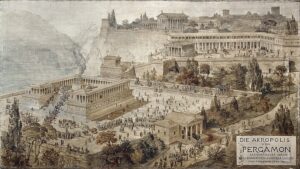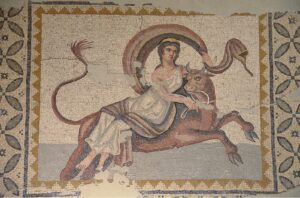Some readers will be aware that I am sympathetic to the view that the books of the Old Testament were products of the Hellenistic era. I believe that sound historical methods involving critical analysis of assertions against evidence make such a late dating highly plausible. But it is also vital to be as fully informed as possible about alternative views that would date the origins of the Hebrew Bible to the Persian era or earlier. This requires looking at linguistic and textual arguments as well as archaeological studies. In coming posts I would like to address some of the readings in these areas that I have been undertaking as I have tried to catch up with old and recent publications. My aim will be to present various arguments in ways that are easily digestible for those of us with little time to study academic tomes and specialist papers.
Meanwhile, it will be of interest to some to know a little more about what the Hellenistic world was like for assessing the plausibility of works like Genesis and Exodus emerging from there.
Can we really imagine whole new histories and family genealogies being invented for particular groups of people?

Let’s look at how the Greek world documented and even created new histories of origins during the Hellenistic era, that is after the conquests of Alexander the Great in the 330s-320s. This is nothing more than an introduction. I quote passages from Tanja S. Scheer’s contribution to A Companion to the Hellenistic World, “The Past in a Hellenistic Present: Myth and Local Tradition”. The first three subheadings are identical to those Scheer used. All bolded highlighting is my own.
Myth as History According to the Greeks
The relationship of Hellenistic Greeks to their past is shaped by much older traditions. In particular two important points characterize the relationship to the past: its genealogical structuring and its re-shaping by epic poetry. . . . Self definition as well as assessment by others are marked by genealogical connections. The past of his own family, of his home city, of his tribe defines the identity and status of the individual in the present . . . . [W]hole cities also prided themselves on their ancestors and founders. (216)
You are probably already reminded of the many genealogies and narratives to justify who’s who and where in the Bible, beginning with Genesis. Genealogies could be used to assert territorial claims but also to explain how related peoples were expected to support one another or know their respective status.
Were these genealogies historically true?
This pronounced Greek interest in ancestry and kinship was, however, not properly historical. The past was only of importance when it was marked by famous personalities or by deeds of mythical heroes. A family tree that ended with an anonymous smallholder was of little use. Even as proof of the great age of a family it could not offer much help: for great age only really began when the genealogy could be traced back to heroic times and thereby into the society of heroes or even gods . . .
Fact checking was not part of the agenda:
People were at a loss when confronted with written or archaeological discoveries from their own past, which chance had brought to light. The Greeks reconstructed the past not so much through concrete evidence from early times but rather with the help of their traditional stories, of myth. . . . Questions about the past led to heroic, not historically correct, answers . . . Already long before Hellenistic times, however, Greek logographers and historians had made the fictional events of epic the focal point of their history and accepted them as containing at least a core of truth. (217)
Ancestries of any worth always went back to the gods:
The habit of evaluating the qualities of individuals and even of cities on the basis of their ancestry understandably encouraged the desire to number the gods themselves — or at least the heroes of epic — among one’s own ancestors. (218)
Past and Present in the Hellenistic Period
 There was, in addition, a moral or ethical aspect. The myths surrounding great ancestors were treated as exemplars of how their descendants were expected to behave. If Heracles had conquered Troy or Asian peoples then his descendants were expected to do the same; if Heracles had shown kindness to a city, his descendants were obligated to do likewise.
There was, in addition, a moral or ethical aspect. The myths surrounding great ancestors were treated as exemplars of how their descendants were expected to behave. If Heracles had conquered Troy or Asian peoples then his descendants were expected to do the same; if Heracles had shown kindness to a city, his descendants were obligated to do likewise.
[T]he history of the family imposed an obligation. Thus the political writer Isokrates could present Herakles as a model for his descendant Philip . . . . The deeds of Herakles in the first conquest of Troy were used to legitimate, and also to oblige, Philip to carry out successful military action in the present — that is the campaign against the Persians . . . . (218)
. . . in the run up to the Persian Wars Persian envoys are supposed to have come to Argos in an attempt to win the Argives over to their side — by appealing to their mutual mythical ancestor Perseus . . . . (219)
(Some scholars have suspected the biblical stories of David’s conquests were created to justify Hasmonean conquests of their neighbours.)
The Greeks Abroad
As the Macedonians and Greeks advanced into new lands of old cultures they did not boast of “being the first” to discover these places; on the contrary,
. . . the stress was placed over and over again on familiar elements in these foreign lands: the geographical opening up of the world took place in the footsteps of great forerunners, of gods and heroes from the mythical past.
Throughout his campaign Alexander recognized Greek gods and heroes in foreign lands; he called on them pointedly and paid honour to them. . . .
In the case of Alexander’s campaigns this emphasis on the mythical past of the Macedonians and Greeks tended to integrate rather than exclude. The aim was by no means a one-sided ennobling of the Macedonians at the expense of the indigenous peoples whom they encountered. Family relationships based on myth did not have the function of an exclusive patent of nobility. Alexander and his generals endeavoured on the contrary to establish a connection between Greeks and Persians. (219)
Some will recall Russell Gmirkin’s discussion of the biblical patriarchs being at ease with local gods in Canaan, some of whom came to be identified with the Israelite deity.
Scheer notes that there was a practical power-play at work by this kind of integration of Greek and local gods:
This integrating use of the mythical past was not simply an unselfish mark of respect or recognition for non-Greek civilizations on the part of the Greeks. At stake surely was the need to prevent the Greek claim to power from appearing to the conquered as foreign rule. (219)
Note, further, that there are two different ways of treating non-Israelite locals (or Canaanites) in the Bible. Many of us know about the commands in Exodus and elsewhere to slaughter them all, or if that cannot be done then to have nothing whatever to do with them. But other narratives demonstrate the virtue of “Israel” being a blessing to foreigners, of peacefully coexisting with their neighbours. (I hope to elaborate on this point in a future post, along with the reasons for thinking that these two viewpoints were even contemporaneous.)
You will recall the stories in Genesis linking patriarchal figures to particular geographical areas where they would erect an altar or bury a family member. We might compare:
At least as important, however, was the opportunity for the Greeks to take mental possession of these new lands. In this aim the structure of the traditional stories of the Greeks was of considerable assistance. A common method of intellectual subjugation of unfamiliar lands consisted in making them accessible through eponymous heroes: every river, every tree, every region, according to the Greek view, was inhabited by local supernatural powers. Once the areas which they reached were mythically personalized, then the local family trees could easily be connected to well-known Greek heroes. . . . The foreign land was not really unknown: their own ancestors had after all once passed through it victoriously. . . . The cultivation of a mythical past was valuable for the Hellenistic present; even in the most far-flung foreign land traces of old familiar patterns could be discovered. Thus, the new world could be integrated into the old as something already familiar. (219f)
Creating Mythical Histories
A major demographic development following Alexander’s conquests was the influx of Greeks into regions that had known few or no Greeks before. Long established urban areas often experienced an influx of Greek migrant settlers. That had consequences for group identities.
The places of settlement had . . . frequently already been settled and were now simply restructured by a Greek component in the population. Several cities acquired a completely new significance as a result. Their new political importance called for ideological underpinning. The past also played an important role for a Hellenistic ‘new foundation’. ‘Newness’ was not a positive factor for the Greeks — just the opposite. This was true for most spheres — beginning with the inauguration of customs or laws, which were attributed to the earliest possible ancestor, and whose obligatory nature derived from their allegedly great age; and applying also to cities and tribes who liked to claim the greatest possible antiquity for themselves. (220f)

Scheer examines the situation of the city of Pergamon. Until it was made a major capital by new Hellenistic rulers Pergamon had been “a city previously of little importance” and was probably not even a Greek city. (The new rulers more than likely chose it as a new centre because of its easily defended location.)
The previous insignificance of the place, its existence as a settlement in Asia Minor in the backwaters of history, was appropriate to the humble origins of its new ruler. Philetairos, son of Attalos and Boa, came from Tieion, a small city in Paphlagonia. His mother Boa did not even bear a Greek name.
The rise of Pergamon to be the capital of a new, prosperous and liberal dynasty directed an attention never before known on settlement and ruler . . . . The rivals with whom it was essential to be of equal birth were the other Hellenistic ruling families with their claims to divine [descent] or at least [descent from Heracles] and the neighbouring Greek cities with an ancient cultural tradition. . . .
The new rulers were able to plausibly find ways to link little known local traditions of a mythical past to their own mythical ancestry and in turn to find links with Heracles and other notables from the Homeric epics. In other words, new genealogies (and supporting narratives) were created to link the hitherto insignificant region into having great importance through ties to heroes of antiquity as well as to the family of the new rulers.
Every authentic memory was hopelessly inferior to this tradition. Even if the recent past of Pergamon in the Hellenistic period was fabricated, nevertheless it must be accepted that structurally any number of well-known mythical narratives of the Greeks could have been considered suitable and appropriated accordingly. The Pergamenes did not, however, make arbitrary use of anything from the pool of stories available. A certain plausibility was required in the founding legend: it ought to permit an inherently logical integration of one’s own city into the mythical-historical system of coordinates that helped make up the Greek world picture. This was best achieved by recourse to pseudo-local tradition . . . . (224f)
This manufacturing of myth-history was not restricted to new rulers transforming backwaters into major centres.
Not only Hellenistic royal families, who wanted to claim a distinguished past as their own, sought a connection to prominent heroes. In the Hellenistic period a large number of cities suddenly began to emphasize their hitherto unknown Greek past with the presentation of mythical founders. . . . .
In the Hellenistic period a past was in great demand not only in Cilicia itself but also along the whole south coast of Asia Minor: from Pamphylia to Syria they all now suddenly remembered their own civic history . . . .
Practically everything speaks against the legitimacy of such claims. According to our standards they are not historically correct. . . . (226)
The further back in time the founding myths could be set the better:
The Cilician cities’ claim to a past reached further back, into mythical prehistory, when gods and heroes were acting in person as city founders. While no records of any kind referring to figures from Greek mythology are preserved for Cilician cities from archaic and classical times, that changed during the Hellenistic period. (226)
The Greeks set the pattern. Previously peripheral places were now creating new foundation myths:
The sudden proliferation of foundation myths that followed the Macedonian conquest indicates how places, which had previously been peripheral, were now trying to shape their conception of the world according to Greek categories. In this attempt however they did not proceed in a purely arbitrary manner. For one thing the link to Homeric epic again came into play. (228)
Many of us have heard of the city of Tarsus in connection with Paul’s origins in New Testament studies. Tarsus is also chosen as an illustration of how a new history of origins was created.
The inhabitants of the city of Tarsos in Cilicia, according to the geographer Strabo, originally came from Argos: `They say that Triptolemos was sent by the Argives in search of Io, who first disappeared in Tyre, and that he travelled through Cilicia; there several of his Argive companions left him and founded Tarsos’ (16.2.5). The strange foundation myth of the Tarsians is a typical example of how people in the Hellenistic period dealt with past and present. We hear for the first time that a search party was sent out to find the Argive princess and priestess Io. It must have seemed very curious to experts in Greek mythology — and every citizen of a polis counted himself as such — that Triptolemos should have taken on such a task, that ended finally in the founding of cities in distant, barbaric places. (216)
The Argives, moreover, were reputed to have been descended from Heracles.

Before Hellenistic times the mythical Io . . .
. . . was driven across the world in the shape of a cow by a gadfly? In the classical versions of the Triptolemos myth Argos was not even mentioned. Strabo is the earliest evidence for this. The hero Triptolemos, who had brought the world the Eleusinian Mysteries and the art of agriculture, was from earliest times an Attic [Greek] national hero. The Argive claim to Triptolemos appears first in Pausanias: even before he went to Athens, he is said to have established mysteries in Argos (Paus. 1.14.2). The search for Io is also first verified in the Hellenistic period. Here it seems to involve a ‘further thinking out of the myth’ by Hellenistic scholars: the similarity in this case with another better known story is only too clear ± with the search for another of Zeus’ loves, Europa. (229)
If Hellenistic scholars took the myth of Zeus chasing Europa and used it as a template to create a new myth for the founding of Tarsus …. we might be reminded of Philippe Wajdenbaum’s survey of biblical stories that appear to have the origins in Greek myths. (There are others who have noted similar adaptations in such cases as the Noah and Lot stories.)
Myth had never been a canonical text in the sacred sense. It was open to new combinations and new emphases: it could be logically ‘thought out further’. (231)
So what does any of the above have to do with the history we read beginning in Genesis?
How might priests and scribes who have embraced a kind of monotheism (another Greek “invention”) and, like Plato, came to deplore the traditional mythical tales of vengeance and subterfuge and woman-chasing, be expected to compete in this world of mythical-history making to promote their cultural and political identities?
Is the Hebrew Bible a valid answer? One thing is clear. With a flurry of peoples creating new myth-histories of origins for themselves we do have a wider intellectual and cultural context that supports the thesis that the biblical literature was produced in the Hellenistic era.
Scheer, Tanja S. “The Past in a Hellenistic Present: Myth and Local Tradition.” In A Companion to the Hellenistic World, edited by Andrew Erskine, 216–31. Malden, Mass.: Wiley-Blackwell, 2005.
If you enjoyed this post, please consider donating to Vridar. Thanks!

One thought on “The Age of Inventions of Mythical Histories — Greek and Biblical”